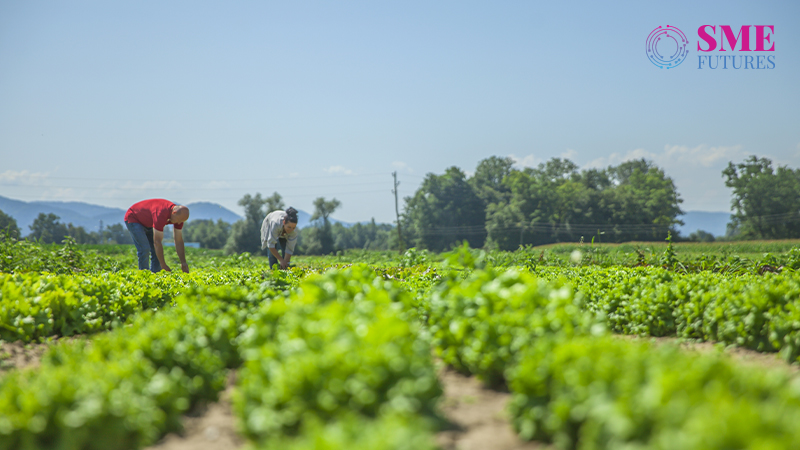Agriculture is the foundation of human civilisation, and the entire human population depends upon several farming practices for food production. In recent decades, the use of chemical fertilisers, pesticides and insecticides has become prevalent in the entire world.
In India too, farmers have been preferring the same for the faster growth of crops, large-scale production and profitability. But the adverse impact of the same is that these chemicals are utterly harmful for not only human health but also soil health. To address this issue, a lot is being done to promote sustainable development through organic farming practices. Also, UNSDG-2 (United Nations Sustainable Development Goals) has linked its aim of ‘Zero Hunger’ with environment-friendly organic farming that will lead to sustainable and nutrition-rich living.
In India, around 58 per cent of the population depends upon agriculture for its livelihood, as recorded by Mordor Intelligence. Considering organic food products, the market is growing steadily year by year. In 2020, it was worth around 11 billion rupees; but within a span of 10 years, i.e., till 2030, the market size is expected to reach around 30 billion rupees.

However, considering the 1.42 billion strong population of India and the prevalent chemical farming practices, this growth rate seems to be quite less. A big reason for this is that Indian farmers hesitate to adopt organic farming practices on larger scales.
Basanta Kumar Kar, also known as the Nutrition Man of India, sharing his vision and experience says, “I have observed that farmers want higher yields, more income and assured production. Somehow, organic farming has not provided that in terms of scale. That is why many Indian and international NGOs have found an opportunity in teaching farmers how and why to do organic farming, how it is related to healthy and sustainable living, self-sufficiency, and how and why it requires minimal investment. Farmers are provided education and guidance so that they can be motivated to do organic farming.”
Farmers hesitant to adopt organic farming
The foremost reason behind farmers hesitating to adopt organic farming is their lack of technical knowledge. This process requires training and imparting necessary information regarding seeds, soil, bio-pesticides, bio-manure and the effective transition and management of organic systems. Without confidence and training, farmers do not want to foray into this field.
Another reason for their reluctance to undertake organic farming are their concerns about yield and profits. Potential yield decreases in the initial transition years and so the profit suddenly declines.
A common challenge that all farmers face is obtaining quality seeds and fertilisers for organic farming. They also struggle to get access to reliable organic markets to obtain seeds and other inputs at feasible prices. Most of the time, organic farming is considered an expensive process. The government is working to promote natural and organic farming with its agricultural policies.
However, there is still the need to align the farmers in this direction. There is also a requirement to create more storage and processing facilities for organic produce. Another reason that prevents farmers from undertaking organic farming is their ambivalence towards trying something new. They might be aware of the benefits but are hesitant because they are afraid to try it.
That’s where NGOs come into play.
NGOs promoting organic farming
Non-government organisations run programmes and campaigns in villages to promote organic farming. Several organisations are working diligently to improve the self-sufficiency of farmer families through organic farming training.
If we consider Madhya Pradesh in India, the state is really conscious about healthy agricultural production because many NGOs are dedicatedly functioning in this direction. For example, Mahatma Gandhi Seva Ashram is a well-known NGO active in Sheopur district of Madhya Pradesh. It is aimed at making the villages nutrition-rich and self-sufficient through organic farming. They run the Farmer Field School to provide training to farmers, help in seed management and store indigenous seeds. These efforts are particularly helping tribal families who struggle to be self-sufficient.
One of the most powerful tools in the NGO arsenal is farmer-to-farmer learning. By connecting organic farming pioneers with those just starting out, NGOs are facilitating the exchange of knowledge and experience. Seeing the success of their peers is incredibly motivating for farmers considering the switch.
Farmers are taught how to prepare manure through cow dung and cow urine, about bio-pesticides, ten-leaf extract, and how to connect other sub-systems like kitchen gardens, cattle, fisheries and poultries with their farms. However, all these processes require training and at least a year’s time and initially they might not even give satisfactory results.
Still, NGOs are working in this direction and spreading knowledge through community voices. They depend on their national and international funders for financial support in executing such tasks and creating links with government departments like Gram Panchayat, Anganwadi and ASHA to spread awareness among farmers and locals. Also, NGOs do policy advocacy to take the initiatives to a higher level.
All these efforts by NGOs ultimately increase consumer awareness, especially in rural areas. However, at a broader and urban level, a lot of work needs to be done to create a strong consumer base. Since organic production is done at a much smaller scale in comparison to the produce obtained by using chemical fertilisers, organic produce is comparatively costlier. This too is a reason behind why many people are reluctant to depend upon organic food products for regular consumption. But with continued efforts, there is a possibility that farmers will adopt organic farming practices on a large scale, which could reduce the prices of organic products in the market.
According to Anil Kumar Gupta, Project Coordinator at Mahatma Gandhi Seva Ashram, “Around 30-40 years ago, farmers used to practice the same kind of farming, which is nowadays termed as ‘organic’. They used cow dung, cow urine and other natural material for good and healthy production. But nowadays, they have a mindset that organic farming does not give good yield and is comparatively less profitable,”
“NGOs are just trying to convince our farmers to go back to the old farming practices that were nature-friendly and healthy for the human body and soil. NGOs motivate them to invest minimally, recycle as much as possible and obtain superb production. The aim is to orient all farmers whether they are rich or poor to follow environment-friendly farming practices and end hunger and malnutrition.”
Organic farming faces substantial hurdles when it comes to widespread adoption, but NGOs are stepping up to the plate and making a real difference.
Government support to organic farming
Several schemes have been launched by the Government of India to promote organic farming practices. The Paramparagat Krishi Vikas Yojana (PKVY), Mission Organic Value Chain Development for the Northeastern Region (MOVCDNER), the Capital Investment Subsidy Scheme (CISS), the Bharatiya Prakritik Krishi Padhati (BPKP), and the Participatory Guarantee System (PGS) or the National Programme for Organic Production (NPOP) are among the primary schemes that have broadened the scale of such farming practices.
Under these initiatives, farmers receive financial assistance to do organic farming on their land. As per the Ministry of Agriculture and Farmer Welfare, these schemes have helped to increase the area under organic farming in India from 11.83 lakh hectares in 2014 to 29.17 lakh hectares in 2020. By 2024, it is expected that the area will further expand to 20 lakh hectares, thereby accelerating organic food production.











